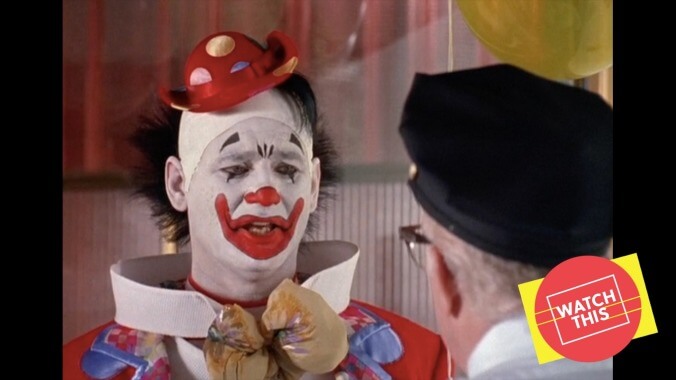Bill Murray captured the whimsical hostility of New York in his underseen directorial debut

Watch This offers movie recommendations inspired by new releases, premieres, current events, or occasionally just our own inscrutable whims. This week: With the release of Andy Samberg’s Palm Springs and the latest Ghostbusters sequel getting pushed to 2021, we’re highlighting movies starring Saturday Night Live alumni.
Quick Change (1990)
Bill Murray became a household name performing on New York City’s signature late-night comedy series. Ten years after leaving Saturday Night Live, he made his only movie so far as co-director, a comedy of errors about an extended and desperate attempt to leave the hellish nightmare that is New York. If that wasn’t enough career-related subtext, Murray opens Quick Change dressed as a clown who, when asked, describes himself as the “crying on the inside” kind.
Grimm (Murray) dons the clown get-up as part of a genuinely clever bank robbery, the last (and only) big score for this disgruntled city planner, his girlfriend Phyllis (Geena Davis), and his faithful sidekick Loomis (Randy Quaid). Their getaway plan is stymied by the very place they’re attempting to escape, as New York throws muggings, poorly marked streets, and unyielding bus drivers in their way. One of the obstacles is played by Murray’s fellow SNL alum Phil Hartman, in a movie version of the crucial “glue” roles he handled so well on the show. As a Village-to-Brooklyn transplant ready to pull a gun to defend his overpriced one-bedroom, he’s one of many bit players shining opposite Murray, who performs in a register best described as whimsically hostile. Usually when a comedy star looks tired in a vehicle, it’s a sign of struggle. Here it’s just Murray mastering his persona, getting big laughs from his minimalist approach.
He also masters the art of the tightly directed 89-minute comedy, working with co-director and screenwriter Howard Franklin. After the opening bank-robbery setpiece, which manages to be both funny and convincing, the movie settles into a series of vignette-style misadventures, none of which overstay their welcome. Franklin and Murray cut their scenes together expertly, refusing to let a funny gesture or reaction shot go to waste; there are plenty of good Bill Murray comedies, but this one feels particularly attuned to his rhythms as a performer, both deadpan and daft. The levelheaded Davis and zanier Quaid both fall into sync with him, even if Davis has to deal with a dead-end subplot addressing her character’s doubts about keeping up with Grimm now that he’s a big-shot bank robber. (This despite the fact that he is plainly eager to enjoy his cleverness from an airplane, flying far away to a life of leisure.)
Viewers watching Quick Change 30 years later might reasonably brace for outdated ideas about New York as a crime-ridden cesspool and nasty stereotyping of the city’s melting pot. In that sense, its stressful comic situations are also a relief: While the movie is about a trio of white people fleeing the city and there are a handful of cheap jokes involving an ethnically ambiguous cab driver (Tony Shalhoub!) who apparently speaks not a single word of English, the filmmakers mostly take an egalitarian approach to the hindrances Grimm’s gang must face. (And the gun-toting exceptions are also white.) Most of the walk-on characters are simply going about their version of a New York routine, which naturally appears inscrutable or maddening to anyone working at cross purposes. This is a movie with deep understanding of the fact that New York will always have multiple people screaming from the back of various vehicles—and that most of them have their reasons.
The geography may no longer be strictly accurate (New Yorkers will spot some formerly desolate-looking Brooklyn locations that have since swung all the way toward gentrification) and the 30-years-later crime rate is much lower. But Quick Change still feels like New York—a cinematic feat that relatively few SNL vets have managed. (“I love this town!” exhortations aside, even the Ghostbusters movies feel a little touristy.) Murray, ever the Chicagoan, probably felt some sort of kinship with Grimm’s loathing for his hometown. It’s equally easy to detect a sneaky form of affection, sitting alongside it inseparably.
Availability: Quick Change is available to rent and/or purchase from Amazon, Google Play, iTunes, YouTube, Fandango, Microsoft, Redbox, and VUDU, despite being an unsung catch-it-on-HBO classic.